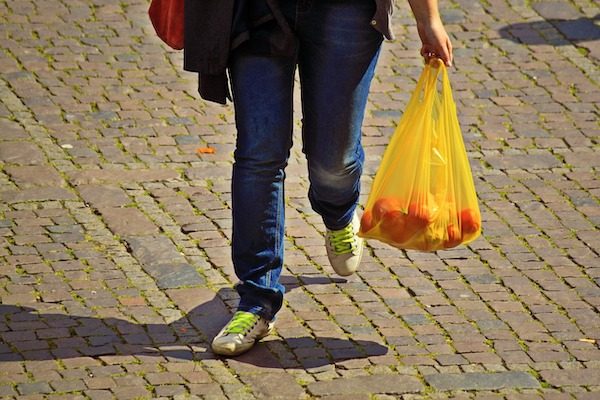Just One Planet: Plastic bags are still a problem in SLO County
This is the first of a new series of articles on environmental issues and sustainability.
By Brigit Binns

Column by Brigit Binns.
–After the plastic bag ban in 2012, everyone got used to bringing their own bags when shopping for food, right? Right? Apparently, not so much.
Plastic bags are still everywhere in SLO County. Farmers’ markets and supermarket produce aisles use flimsy bags with abandon—almost all are thrown away after a single use.
And, not long after the 2012 ban, plastic bag manufacturers lobbied Sacramento to allow production and sale of heavier bags, ie 2.5ml. These bags are much thicker than the old bags, but people are still throwing them away. Even worse: these heavier bags take far longer to break down.
First, the sad facts (and then a positive step you can take!):
- Americans use 100 billion plastic bags a year, which requires 12 million barrels of oil to manufacture.
- The average American family takes home almost 1,500 plastic shopping bags a year.
- According to Waste Management, only 1 percent of plastic bags are returned for recycling. That means that the average family only recycles 15 bags a year; the rest end up in landfills or as litter.
- Up to 80 percent of ocean plastic pollution enters the ocean from land.
- At least 267 different species have been affected by plastic pollution in the ocean.
- 100,000 marine animals are killed by plastic bags annually.
- One in three leatherback sea turtles have been found with plastic in their stomachs.
- Plastic bags are used for an average of 12 minutes.
- It takes 500 (or more) years for a plastic bag to degrade in a landfill. Unfortunately, the bags don’t break down completely but instead photo-degrade, becoming microplastics that absorb toxins and continue to pollute the environment.
- It only takes about 14 plastic bags for the equivalent of the gas required to drive one mile.
Source: The Center for Biological Diversity “Ten Facts about Single-Use Plastic Bags.”
Our waste processing facilities in SLO County can not tolerate any plastic bags; when they’re introduced, the machinery breaks down and the whole load, whether recyclable or not, usually ends up in a landfill. According to the IWMA (Integrated Waste Management Authority) and Janine Rands of SLO Citizens for Action, even the plastic bags that are recycled correctly (via drop-off at Walmart or Kohls) may be ending up in landfills. “No one at Cal-Recycle will go on the record as to what really happens to plastic film,” says Aaron Gomez of IWMA, adding that it may be trucked to Nevada, where regulations are more lax, and then dumped in a landfill.
A growing segment of the local population is asking county legislators and city councils to “Say No to Plastic Bags.” On Wednesday, Jan. 8 the IWMA Board will meet to will address a variety of county ordinances that need to be updated; plastic bags are on this list.
Want to make a difference? Write a quick email to iwma@iwma.com and express your support for this wider ban on plastic bags. The board wants to hear from you, and if the board supports the ban, it’s one big step closer to becoming reality (see below for the text of the update request; paste this into your email, if desired).
Be sure to check here for common recycling questions in SLO County, and remember to “Reduce, reuse, and recycle” whenever humanly possible.
SLO CITIZENS FOR ACTION REQUESTS THE IWMA: Extend the provisions of the existing plastic bag ordinance with these additions:
- All Single-use plastic bags are banned from distribution at the point-of-sale, including: Farmer’s Markets, restaurants, dry cleaners.
- Newspaper delivery bags used only during the rainy season.
- That the ordinance requires reusable plastic bags be manufactured with a ribbon handle;
- That a plastic mil of 4.0 or greater is required, composed of at least 60% recycled material.
- Consider grocery retail bulk, vegetable produce and meat. That accepted bags replace undesirables.
- That the IWMA increase education and a campaign logo, like. “Sustainable SLO” – design a cloth, nylon, or 100% recycled plastic washable bag. “Bring reusable bags every time you shop”.
Note: The opinions in this article are those of the author, and some information was provided by Janine Rands, the driving force behind SLO Citizens for Action.






















